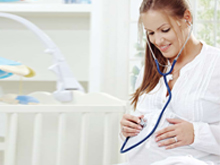Health Topics
-
Healthy Living
-
|
|
july 2010
|
| Checklist for Mom-to-be |
| Dr. Rashmi Sharma |
| |
 |
Before that first bra was introduced to a lit up matchstick, pregnancy was supposed to give (more) meaning to a woman’s life. The birth of a baby is no less exciting even today – nor is the planning that precedes it. Here’s a list of things expectant parents can do to make the whole experience a little less tiring. |
8 Ways to Get Ready
- Don’t miss any of your scheduled appointments with your gynaecologist – this could be detrimental to your health and that of your child.
- Go through the pregnancy, childbirth and parenting classes arranged by your hospital or doctor, if any. Schedule your classes at around weeks 28-34 of your pregnancy.
- Select a paediatrician right away. Ask around – hopefully, he/she would be from the same hospital. Have their contact info ready when you are brought in for delivery.
- Get your pre-admission package from your chosen hospital. Go through it thoroughly.
- Call up your insurance company, if any, to make sure that maternity services are covered within the plan.
- Schedule a tour of the hospital and its labour ward or birthing suite, where you’ll be delivering. Do this at least six to eight weeks before your delivery.
- Ask your doctor about when to come to the hospital if you think you are in labour. Make sure to ask where to go, in case you go into labour in the middle of the night. Some hospitals have different entrances for after-hours deliveries.
- Ask your husband to do a dry-run of rushing you to the hospital when you are in labour. Maybe you won’t need it, but it’ll sure be fun (talk about preparing him for fatherhood). And who knows, it could come of use too.
Mom’s Bag
What all should you take with you to the hospital? Chalk out a check list like the one here – and ensure the bag is packed, at least four to six weeks before your expected date of delivery.
- Two or three nightgowns with front opening and undergarments including some nursing bras (that provide additional support for milk filled breasts, and permit breastfeeding without needing to remove the bra) and slippers.
- Your toothbrush, hairbrush and other personal toiletries – that goes without saying.
- Comfort items that are important to you, such as your own pillow, your favourite cream and laptop (Facebook!), cellphone with essential numbers stored (but limit your talks on it), prayer books, etc.
- A digital camera, batteries and charger. Video camera, if you have one.
- Clothes to go home in.
Baby’s Bag
- Baby wipes and homemade diapers – you’d be surprised how much ‘stuff’ babies can produce.
- Receiving blankets and newborn clothes.
- Baby fingernail cutters. Many babies are born with long fingernails that need to be clipped.
- As much as possible – breastfeed. It’s good for both the mother and the child. But in case you’re not planning to – baby food.
- A cute outfit for your baby’s first photo.
- Clothes for the baby to go home in.
Dad’s Bag
While the wife labours it out, the man of the family needs to take charge of other management – if the husband plans to be around at all! Pack a few items for immediate family members in a separate bag.
- For the father-to-be, pack nightwear, a blanket, a change of clothes, and toiletries. And yes, the phone. No cigarettes.
- If the new baby has older siblings, or if small children would be part of the visiting brigade, pack games, colouring books, and other toys to keep them entertained.
|
 |
Dr. Rashmi Sharma is Sr.Consultant Gynaecologist at Apollo Hospitals, Bilaspur |
|
|